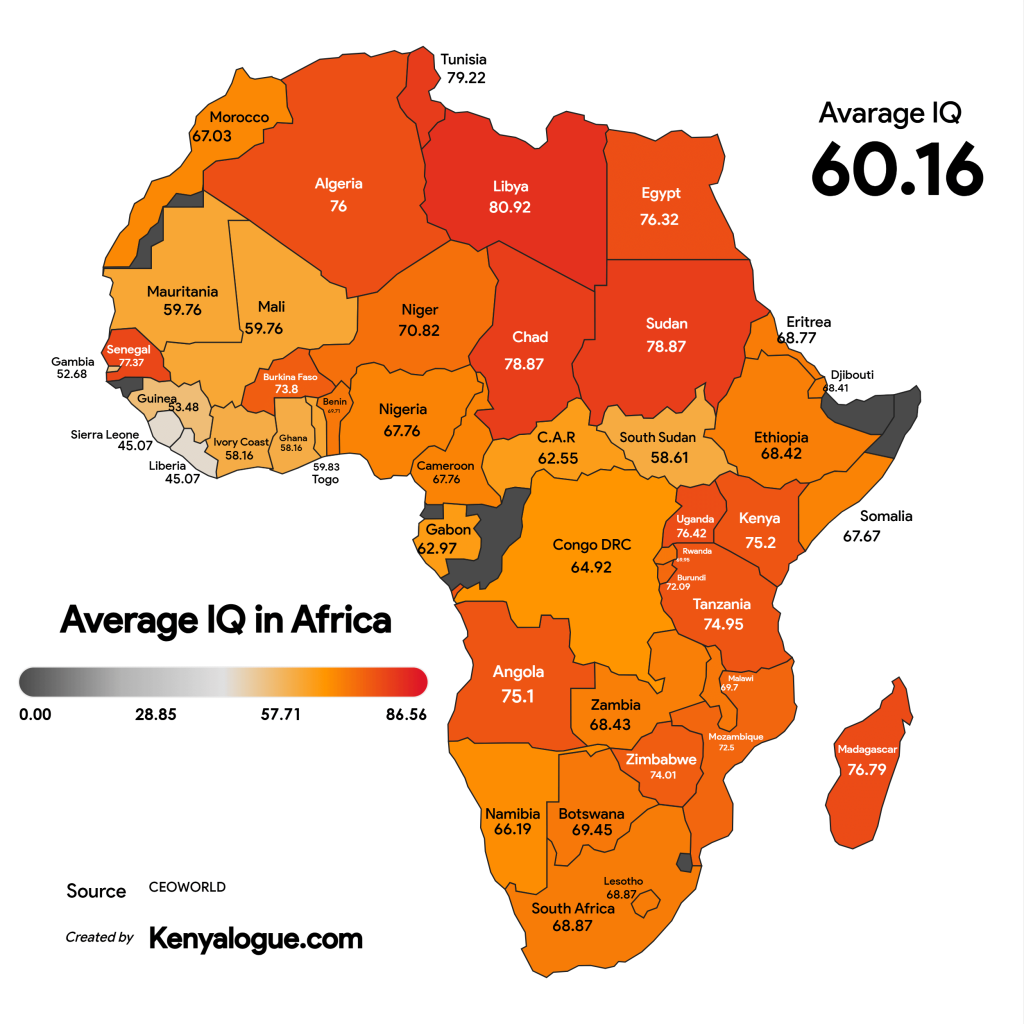
IQ (Intelligence Quotient) scores are widely used to assess cognitive abilities through standardized tests. These scores compare an individual’s reasoning and problem-solving skills to the broader population, where the average typically hovers around 100.
To explore how intelligence varies across Africa, we’ve analyzed data from CEOWORLD magazine’s August 2024 report.
It’s important to recognize that IQ scores have their limitations and do not fully capture all aspects of intelligence, such as creativity, emotional intelligence, or problem-solving in real-world scenarios. While these numbers provide insight into cognitive ability, they do not define a nation’s overall intellectual potential. The data used to create this visualization is detailed in the table below.
| Rank | Country | Average IQ |
|---|---|---|
| 1 | Mauritius | 86.56 |
| 2 | Libya | 80.92 |
| 3 | Tunisia | 79.22 |
| 4 | Seychelles | 78.76 |
| 5 | Sudan | 78.87 |
| 6 | Chad | 78.87 |
| 7 | Senegal | 77.37 |
| 8 | Comoros | 77.07 |
| 9 | Madagascar | 76.79 |
| 10 | Uganda | 76.42 |
| 11 | Egypt | 76.32 |
| 12 | Algeria | 76.00 |
| 13 | Kenya | 75.20 |
| 14 | Angola | 75.10 |
| 15 | Tanzania | 74.95 |
| 16 | Zimbabwe | 74.01 |
| 17 | Burkina Faso | 73.80 |
| 18 | Mozambique | 72.50 |
| 19 | Burundi | 72.09 |
| 20 | Niger | 70.82 |
| 21 | Rwanda | 69.95 |
| 22 | Benin | 69.71 |
| 23 | Malawi | 69.70 |
| 24 | Botswana | 69.45 |
| 25 | South Africa | 68.87 |
| 26 | Lesotho | 68.87 |
| 27 | Eswatini | 68.87 |
| 28 | Eritrea | 68.77 |
| 29 | Zambia | 68.43 |
| 30 | Ethiopia | 68.42 |
| 31 | Djibouti | 68.41 |
| 32 | Nigeria | 67.76 |
| 33 | Cameroon | 67.76 |
| 34 | Somalia | 67.67 |
| 35 | Morocco | 67.03 |
| 36 | Namibia | 66.19 |
| 37 | São Tomé and Príncipe | 65.22 |
| 38 | DR Congo | 64.92 |
| 39 | Republic of the Congo | 62.97 |
| 40 | Gabon | 62.97 |
| 41 | Central African Republic | 62.55 |
| 42 | Togo | 59.83 |
| 43 | Mali | 59.76 |
| 44 | Mauritania | 59.76 |
| 45 | South Sudan | 58.61 |
| 46 | Ghana | 58.16 |
| 47 | Ivory Coast | 58.16 |
| 48 | Guinea | 53.48 |
| 49 | Gambia | 52.68 |
| 50 | Cape Verde | 52.50 |
| 51 | Sierra Leone | 45.07 |
| 52 | Liberia | 45.07 |
The dataset reveals that average IQ scores across African nations range from 86.56 at the highest to 45.07 at the lowest.
The highest average IQ in Africa is recorded in Mauritius, with a score of 86.56, followed by Libya at 80.92 and Tunisia at 79.22.
These countries stand out due to factors such as strong educational foundations, investments in research and development, and policies that foster intellectual growth. Their higher scores suggest a consistent emphasis on cognitive development and academic achievement within their populations.
While IQ is just one of many indicators of intellectual ability, it can reflect broader societal trends in education, access to resources, and overall cognitive development. IQ tests aim to measure various cognitive skills such as logical reasoning, problem-solving, and comprehension. However, they remain a topic of debate, as intelligence is multifaceted and influenced by numerous external factors.
But a country’s average IQ does not define the intelligence of every individual within it. Intelligence is shaped by a mix of genetics, environment, education, and life experiences. High national IQ averages often correlate with strong infrastructure and educational policies, but they do not serve as an absolute measure of personal or societal potential.
